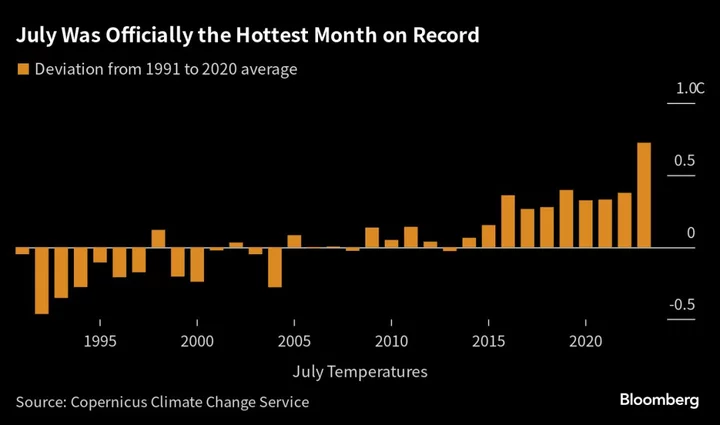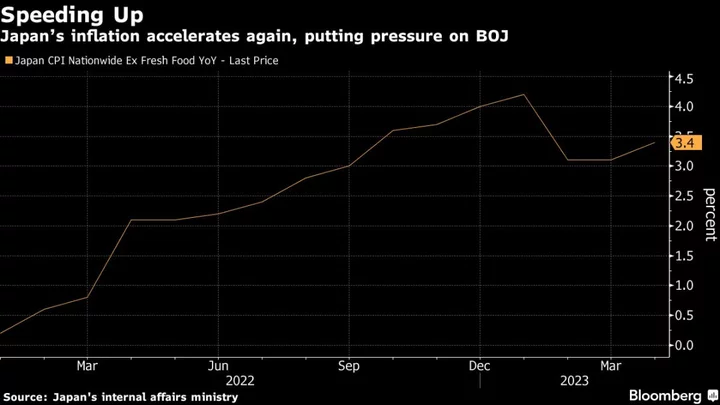NatWest Group Plc said there were “serious failings” in its treatment of the Brexit campaigner-turned-television presenter Nigel Farage, including how it handled his confidential information, as the months-long debanking saga continues to dent its reputation.
The lender said it would make a number of changes to its policies and procedures around exiting clients and will disclose its decision on whether it will cut the pay of former Chief Executive Officer Alison Rose as soon as possible, according to a statement released alongside its third-quarter results on Friday.
“This report sets out a number of serious failings in the treatment of Mr Farage,” Chairman Howard Davies said in the statement. “The findings set out clear shortcomings in how it was reached as well as failures in how we communicated with him and in relation to client confidentiality.”
The report, while finding that the decision to debank Farage was lawful, set out a litany of shortcomings and is set to increase the scrutiny of the bank just as its latest set of results underlined the intensifying competition it faces in the UK deposit market, which sent its shares tumbling.
The Financial Conduct Authority said on Friday it is scrutinizing the firm’s governance, systems and controls. And earlier this week, it was revealed that the UK’s Information Commissioner’s Office has concluded that Rose breached data protection laws when she discussed the closure of Farage’s bank account with a reporter.
Farage described the report as a whitewash in a statement. “The Travers Smith report is inconclusive and ignores the elephant in the room,” he said. “What really matters now is the next steps that the ICO takes and, perhaps more importantly, what the FCA, the regulator of this industry, does about this scandal.”
The bank’s findings arose as part of an independent review conducted by law firm Travers Smith into its decision to close Farage’s accounts and the circumstances surrounding a potential breach of confidentiality by Rose relating to his customer information. While the review confirmed the “lawful basis for the exit decision,” it said the bank had failed to treat Farage fairly.
Rose left NatWest “by mutual consent” in late July after she apologized for speaking to a journalist about Farage following his complaint that the bank had written to him saying it was planning to close his account. The overall pay package potentially at stake is worth more than £10 million ($12.1 million) in pay and unvested shares, according to calculations by Bloomberg.
Key conclusions of the Travers Smith report include:
- The exit decision — which Rose played no part in — was predominantly a commercial decision;
- Coutts’ relationship with Farage was significantly loss-making and the NatWest unit also perceived Farage as a reputational risk because of his views on the environment, race, gender and migration, but this was not a driving factor in the decision;
- The process to review Farage’s accounts was sparked by press reports in January 2022 relating to comments made by Farage about the Black Lives Matter movement, and in April 2022, relating to his alleged Russian links;
- There was no evidence that Farage’s pro-Brexit stance or his party-political affiliations were factors in the decision to close his accounts;
- Some of the tone and language in the Wealth Businesses Reputational Risk Committee’s submission seen by Farage was “inappropriate and illadvised” and could have given the impression that the decision was made on the basis of his views;
- Confidential customer information concerning Farage was “conveyed, whether expressly or impliedly, from Alison Rose to the BBC” in early July although there was no leak of Farage’s detailed financial information.
The statement noted that a further review of other account closures at Coutts over the last two years by Travers Smith is still ongoing, with the findings expected later this year.
--With assistance from Anders Melin.
(Updates with details throughout)









